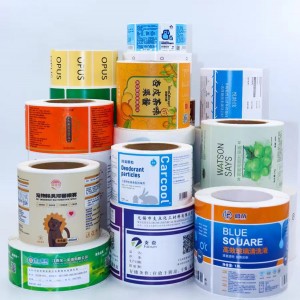1. Material selection: understand the characteristics of different materials
The material of the self-adhesive label directly affects its appearance, durability, and applicable environment. Paper labels are the most economical choice and are suitable for indoor use and short-term applications, but they have poor water resistance and abrasion resistance. Film labels (such as PET, PVC, PP, etc.) have excellent weather resistance and are suitable for outdoor or harsh environments. Special materials such as anti-counterfeiting labels and high-temperature resistant labels are designed for special needs. When choosing materials, it is necessary to consider the product’s use environment, expected life, and budget constraints. For example, outdoor products should give priority to weather-resistant film materials, while short-term promotional labels can use lower-cost paper options.
2. Viscosity requirements: Choose the right adhesive according to the application scenario
Viscosity is a key factor in ensuring that the label is firmly attached. Different adhesive types (such as permanent, removable, super strong adhesive, etc.) are suitable for different surfaces and environmental conditions. Permanent adhesives are suitable for scenarios that require long-term fixation, while removable adhesives are convenient for temporary identification or price marking. In addition, the surface material also affects the viscosity performance. Rough, porous or non-polar surfaces (such as PE and PP plastics) require special adhesive formulas. Environmental factors such as temperature, humidity, cleanliness, etc. will also affect the viscosity performance. For example, a cold storage environment requires low-temperature resistant glue, while a high-temperature environment requires heat-resistant adhesive.
3. Application analysis: Label selection guide for different industries
Different industries have different needs for labels. The food industry requires label materials that meet hygiene standards, often using PP or PE films, and considering properties such as grease resistance and freezing resistance. The logistics industry pays attention to the wear resistance and information carrying capacity of the label, and often uses high-strength PET materials with tear-resistant design. The retail industry pays attention to the printing effect and removability of the label, and often uses high-gloss or matte paper labels. Special industries such as the electronics industry may require anti-static labels, while the chemical industry requires corrosion-resistant materials. Selecting labels according to specific uses can avoid problems such as insufficient performance or over-configuration.
Post time: Apr-18-2025


